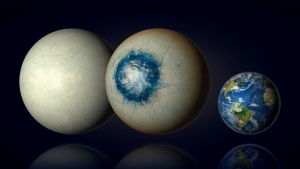Quebec Scientists Make Groundbreaking Discovery of Water World Beyond Our Solar System
A team of Quebec scientists has made a groundbreaking discovery that could change our understanding of the universe. Using data from NASA’s Kepler Space Telescope, the team has identified a water world outside of our solar system.
The planet, named K2-18b, is located 110 light-years away from Earth and is approximately twice the size of our planet. What makes this discovery so significant is the presence of water vapor in the planet’s atmosphere, making it the only known exoplanet with both water and temperatures that could support life.
Lead researcher, Dr. Björn Benneke from the Institute for Research on Exoplanets at the Université de Montréal, explains that this discovery is a major step towards finding habitable planets beyond our solar system. He states, “This is the first time we have detected water on a planet in the habitable zone around a star where the temperature is potentially compatible with the presence of life.”
The team used a technique called transmission spectroscopy to analyze the light passing through the planet’s atmosphere. This allowed them to identify the presence of water vapor, as well as other molecules such as methane and hydrogen. The planet’s atmosphere is also believed to have a thick layer of hydrogen, which could potentially act as a shield against harmful radiation from its host star.
While the planet’s surface is likely to be uninhabitable due to its high temperatures and pressure, the discovery of water vapor in its atmosphere opens up the possibility of finding other habitable planets in the universe. Dr. Benneke states, “With the current data, we can’t distinguish whether the planet has a rocky or gaseous composition, but this is a step towards answering the fundamental question of whether planets like Earth are common in our galaxy.”
The team’s findings have been published in the journal Nature Astronomy and have already sparked excitement and interest among the scientific community. This discovery not only expands our knowledge of the universe but also brings us one step closer to answering the age-old question of whether we are alone in the universe.
This groundbreaking discovery by Quebec scientists serves as a reminder of the importance of continued research and exploration in the field of astronomy. With new technologies and techniques, we are constantly uncovering new and exciting information about the vastness of our universe. The team’s findings have opened up a whole new realm of possibilities and have reignited our curiosity about the mysteries of the cosmos.




